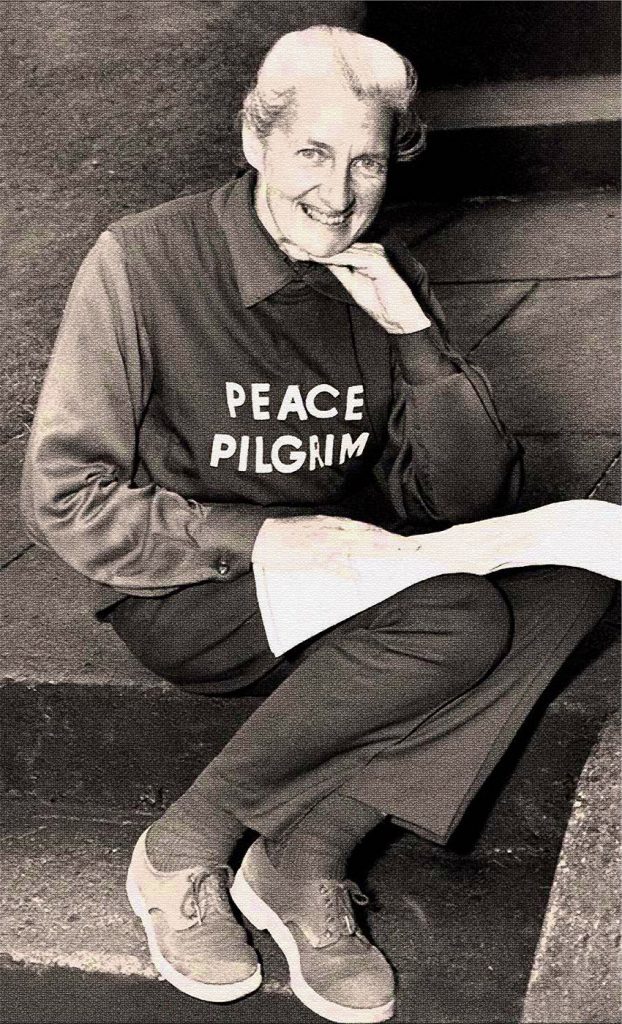In 1953, a woman from Vermont named Mildred Lisette Norman gave up all her worldly belongings, took on the name “Peace Pilgrim” and started walking.
She described the picture that formed in her mind of the garb she should wear: a simple tunic with pockets for a toothbrush, comb, pen and a small pad of paper. Soft canvas shoes. A pair of worn slacks.
Starting in Pasadena, California, she walked across and around the U.S. for the next 28 years, fasting until she was given food, walking until she was given shelter, talking to anyone who wanted to listen about peace.
“This has been our trouble down through the ages — we have given only lip service to Christian values, and lived by the jungle law of tooth and claw,” she observed. “We have quoted, ‘Be not overcome of evil, overcome evil with good’ and then attempted to overcome evil with more evil, thereby multiplying the evil.”
Like St. Paul, the Peace Pilgrim wandered with a purpose, and like St. Paul, she could go rich or poor. She could sleep equally well under a pile of newspapers by the side of the road, or in a feather bed in a mansion.
The Peace Pilgrim’s bold adventure strikes me as downright captivating. Think of how much easier life would be! No having to get your oil changed, no showing up for jury duty, no dusting. For years I’ve carried around a little blue pamphlet called “Steps Toward Inner Peace by Peace Pilgrim” that I picked up for free at the Catholic Worker house in L.A.
What might happen if we all took these insights in her book to heart?
“The positive approach inspires — the negative approach makes angry. When you make people angry they act in accordance with their baser instincts, often violently and irrationally. When you inspire people they act in accordance with their higher instincts, sensibly and rationally.”
“There is a magic formula for resolving conflicts. It is this: Have as your objective the resolving of the conflict, not the gaining of advantage. There is a magic formula for avoiding conflicts. It is this: Be concerned that you do not offend, so that you are not offended.”
Far from trying to make a buck off her efforts, the Peace Pilgrim spread the gospel for free. Her pamphlet noted: “‘Steps Toward Inner Peace’ is not copyrighted and you are welcome to reprint it in whole or in part. It has now been translated into 20 languages and published in a few countries. We hope that in time it will be translated into many more languages and published in every country in the world.”
Another of her works is a book called “Peace Pilgrim: Her Life and Work in Her Own Words.” Here, she reported that when she wasn’t on the road she was speaking and gathering signatures for three petitions she carried.
“The first was a short plea for immediate peace in Korea. It read: ‘Let the killing in Korea cease! Then deal with this conflict situation according to the only principles which can solve it — overcome evil with good and falsehood with truth and hatred with love.’”
The second petition was directed to the president and congressional leaders requesting the installation of a Peace Department. It read: “This is the way of peace, overcome evil with good and falsehood with truth and hatred with love. We plead for the establishment of a Peace Department, with a Secretary of Peace who accepts these principles — and with all conflicts at home and abroad to be referred to this Peace Department.”
The third petition was a plea to the United Nations and world leaders for world disarmament and reconstruction.
She described, after “a wonderful sojourn in the wilderness,” walking the streets of a city along which “neatly dressed human beings with pale and painted faces” were hurrying to line up in orderly rows to go first to their jobs and then to stores to spend the money they’d earned.
“Thousands of things are displayed — and yet, my friends, the most valuable are missing. Freedom is not displayed, nor health, nor happiness, nor peace of mind. To obtain these things, my friends, you too may need to escape from the orderly lines and risk being looked upon disdainfully.”
Tragically, the Peace Pilgrim died in 1981 when the car in which she was being driven to her next speaking engagement crashed.
But her message — that one lone individual with an awakened conscience can right a whole slew of wrongs — could not be more timely.
“Ultimate peace begins within; when we find peace within there will be no more conflict, no more occasion for war. If this is the peace you seek, purify your body by sensible living habits, purify your mind by expelling all negative thoughts, purify your motives by casting out any ideas of greed or self-striving and by seeking to serve your fellow human beings, purify your desires by eliminating all wishes for material possessions or self-glorification and by desiring to know and do God’s will for you. Inspire others to do likewise.”
Now that’s “activism.”
Heather King is a blogger, speaker and the author of several books.

